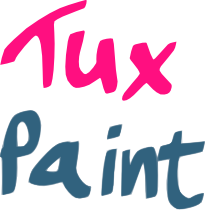
バージョン 0.9.35
PNG Documentation
Copyright © 2007-2022 by various contributors; AUTHORS.txt 参照.
https://tuxpaint.org/
2022年6月 4日

Copyright © 2007-2022 by various contributors; AUTHORS.txt 参照.
https://tuxpaint.org/
2022年6月 4日
PNG is the Portable Network Graphic format. It is an open standard, not burdened by patents (like GIFs). It is a highly compressed format (though not "lossy" like JPEGs - lossiness allows files to be much smaller, but introduces 'mistakes' in the image when saved), and supports 24-bit color (16.7 million colors) as well as a full "alpha channel" - that is, each pixel can have a varying degree of transparency.
For more information, visit: http://www.libpng.org/
These features (openness, losslessness, compression, transparency/alpha) make it the best choice for Tux Paint. (Tux Paint's support for the PNG format comes from the Open Source SDL_Image library, which in turn gets it from the libPNG library.)
Support for many colors allows photo-quality "rubber stamp" images to be used in Tux Paint, and alpha transparency allows for high-quality brushes.
The following is a very brief list of ways to create PNGs or convert existing images into PNGs.
Excellent tools with which to create PNG images for use in Tux Paint are GIMP and Krita, both high-quality Open Source interactive drawing and photo editing programs.
It is likely that one or both are already installed on your system. If not, they should be readily available from your Linux distribution's software repository. If not, or to learn more, visit http://www.gimp.org/ and http://www.krita.org/, respectively.
The Portable Bitmap tools (collectively known as "NetPBM") is a collection of Open Source command-line tools which convert to and from various formats, including GIF, TIFF, BMP, PNG, and many more.
It is possible that it's already installed on your system. If not, they it be readily available from your Linux distribution's software repository. If not, or to learn more, visit http://netpbm.sourceforge.net/.
The "cjpeg" and "djpeg" command-line programs convert between the NetPBM Portable Any Map (PNM) format and JPEGs. It is possible that it's already installed on your system. If not, they it be readily available from your Linux distribution's software repository. If not, or to learn more, visit https://jpegclub.org/.